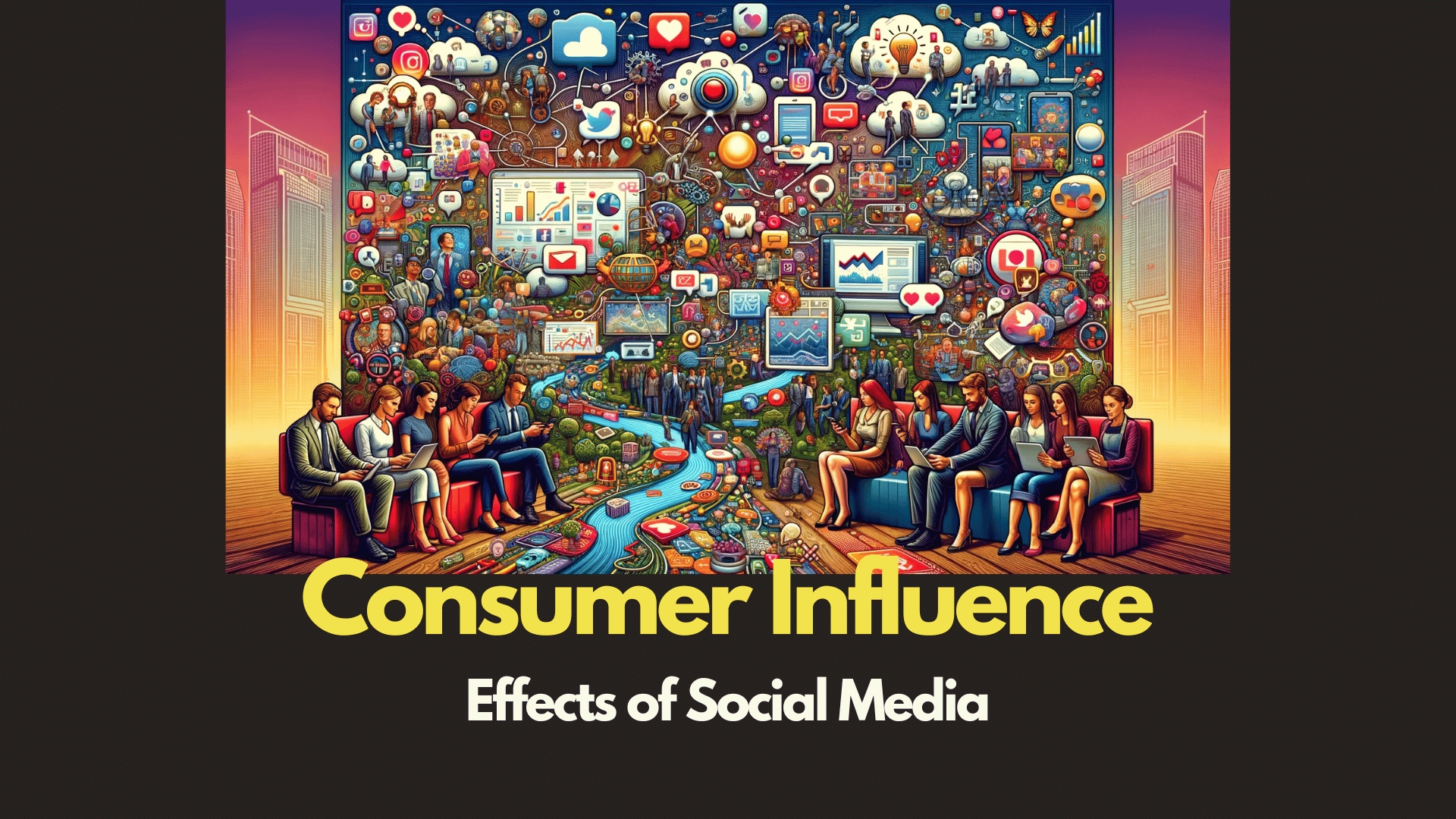Published
- 7 min read
Social Media's Influence on Consumer Behavior

| Key Takeaways |
|---|
| Social media platforms are pivotal in shaping consumer behavior and buying trends. |
| The influence of social media extends beyond marketing into the realms of health and wellness, and business strategies. |
| Understanding the psychological impact of social media can help businesses craft more effective marketing strategies. |
Introduction
Social media has woven itself into the very fabric of our daily lives, influencing not just how we communicate but also how we make decisions, particularly when it comes to purchasing products and services. In this digital era, the Social Media’s Influence on Consumer Behavior has become a focal point for businesses and marketers alike. Let’s delve into how these platforms shape buying trends and decisions, and what this means for businesses today.
The Psychology Behind Social Media’s Pull

The power of social media lies in its ability to tap into the human psyche. Posts, ads, and recommendations on these platforms are not just seen—they are felt. The color of success in marketing psychology is often a key player in this digital arena, influencing emotions and, subsequently, consumer behavior.
The Ripple Effect on Business Strategies
As social media continues to influence consumer choices, businesses are compelled to adapt. Crafting a balanced marketing strategy that leverages consumer psychology is no longer a nice-to-have—it’s a must. Companies that understand and implement social media insights can navigate the market more effectively, as seen in various thriving and stumbling business sectors over the last few years.
Health and Wellness in the Age of Social Media
Interestingly, social media’s influence transcends the commercial realm and enters personal well-being. The healing power of delta waves, for example, has been a topic of interest, with platforms promoting mindfulness and wellness trends that directly affect consumer behavior in the health sector.
Shaping the Marketing Landscape
Marketing strategies have had to evolve rapidly to keep pace with social media’s impact on consumer behavior. From the impact of cultural factors to the hidden psychology behind brand loyalty, understanding these nuances is key to developing campaigns that resonate with the target audience.
The Future of Consumer Behavior Analysis
As we look ahead, the role of social media in shaping consumer behavior is only set to increase. Tools and methodologies for unraveling the secrets of consumer behavior analysis will continue to evolve, providing invaluable insights for businesses aiming to stay ahead of the curve.
Wrap-up
In conclusion, the influence of social media on consumer behavior is a phenomenon that cannot be ignored. By understanding and leveraging this digital impact, businesses can not only anticipate consumer needs but also shape them.
Navigating the Digital Influence on Shopping Trends

The retail landscape has undergone a seismic shift with the advent of social media. Platforms such as Instagram, Facebook, and Pinterest have become virtual showrooms where the latest trends and products are on display. The impact of social media on teen shopping trends is particularly significant, as this demographic is highly influenced by influencers and peer recommendations online. Brands that harness this influence can drive significant engagement and sales among younger consumers.
Online vs. Offline: A Blended Experience
The line between online and offline shopping is blurring as social media integrates into the physical shopping experience. Consumers might see a product online and choose to experience it in-store, or vice versa. This omnichannel approach is detailed in the exploration of consumer behavior in online vs. offline shopping dynamics, highlighting the need for a cohesive brand presence across all platforms.
Leveraging Technology for Mindful Consumption
In an interesting twist, social media is also playing a role in promoting mindful consumption. Platforms are increasingly being used to share information on sustainability and ethical practices. The discussion on weaving sustainability into fashion’s future is an excellent example of how social media can drive consumer behavior towards more conscious purchasing decisions.
The Role of Emotions in Social Media Interactions
Emotions play a significant role in how consumers interact with brands on social media. The role of emotions in purchasing decisions is amplified by the immediate and personal nature of social media, where consumers often feel a direct connection with brands. This emotional engagement can be a powerful driver for sales and brand loyalty.
The Intersection of Technology and Mindfulness
Social media isn’t just about pushing consumers to buy more; it’s also about creating a space for mindfulness and well-being. The intersection of technology and mindfulness is an emerging trend, with apps and platforms offering ways to integrate mindfulness practices into daily routines, potentially influencing consumer behavior towards health and wellness products.
The Future of Marketing in a Social Media-Driven World
As we venture further into the digital age, the future of marketing is inextricably linked with social media. The ultimate guide to crafting a marketing strategy includes practical examples and ready-to-use samples that take into account the profound influence social media has on consumer behavior. Businesses that stay attuned to these digital trends will be better positioned to meet the evolving needs and desires of their customers.
Wrap-up
The pervasive influence of social media on consumer behavior presents both challenges and opportunities for businesses. To remain relevant and competitive, companies must embrace the digital transformation and the insights it offers into consumer preferences and trends.
Decoding the Consumer Decision-Making Process

The decision-making process of consumers has been profoundly affected by social media. Traditional models of consumer behavior have had to expand to include the digital influences that guide a buyer’s journey. The understanding of consumer decision-making processes has become more complex as social media introduces new touchpoints and opportunities for brands to engage with potential customers.
The Power of Psychological Triggers in Advertising
Social media platforms have become hotbeds for psychological triggers that can lead to impulse purchases or brand preference. Utilizing the power of psychological triggers in advertising, marketers can create content that resonates on a deeper emotional level, encouraging consumers to take action.
Consumer Behavior and the Role of Age and Gender
Age and gender continue to play significant roles in retail purchasing, with social media platforms often targeting specific demographics with tailored content. By understanding consumer behavior and the role of age and gender, businesses can create more effective marketing campaigns that resonate with their intended audience.
The Impact of Color Psychology in Marketing
Color psychology remains a powerful tool in marketing, with its impact only amplified by social media’s visual nature. The impact of color psychology on marketing and consumer perception can be seen in the way brands present themselves online, using color to evoke specific emotions and reactions that drive consumer behavior.
Harnessing the Connection Between Brain Waves and Consumer Behavior
An intriguing aspect of consumer behavior is the connection between mental states and purchasing decisions. Understanding how brain waves influence frequencies of the mind can provide insights into the best times to engage consumers or present them with certain types of content on social media.
The Psychology of Pricing and Consumer Perceptions
Price is a critical factor in consumer decisions, and social media has changed the way consumers perceive value. The psychology of pricing and how to leverage consumer perceptions is essential knowledge for businesses looking to price their products effectively in a market where comparisons are just a click away.
The Role of Social Proof in Shaping Buying Trends
Social proof, such as reviews, testimonials, and influencer endorsements, has a significant impact on consumer behavior. The visibility of social proof on social media platforms can greatly influence buying trends, as consumers often look to others for validation of their purchasing choices.
Conclusion
The influence of social media on consumer behavior is a dynamic and ever-evolving aspect of the digital world. For businesses, staying informed and adaptable is crucial.